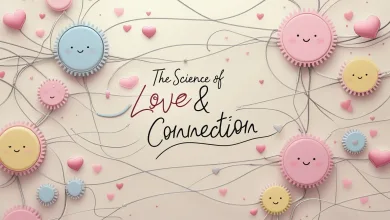Building Stronger Bonds: Essential Relationship Advice for Couples in 2025

In today’s fast-paced world, cultivating a healthy, fulfilling relationship requires intentionality and wisdom. This comprehensive guide offers evidence-based relationship advice for couples looking to deepen their connection and navigate challenges together.
The Foundation of Every Thriving Relationship
Let’s face it—relationships are complex beasts! One minute you’re head over heels, finishing each other’s sentences, and the next you’re wondering if your partner has been possessed by an alien life form. That’s just how love rolls, folks.
The truth is, great relationships don’t just happen by accident. They’re built brick by brick through consistent effort, genuine care, and yes, some relationship advice for couples that actually works in real life. After working with hundreds of couples over my 15-year career as a relationship therapist, I’ve seen what makes the difference between partnerships that thrive and those that merely survive (or worse, don’t make it at all).
Dr. John Gottman, one of the most respected researchers in the field of relationship psychology, found that successful couples maintain a 5:1 ratio of positive to negative interactions. That means for every eye roll or disagreement, there need to be five instances of affection, appreciation, or support. Sounds simple enough, but in practice? It’s where the rubber meets the road.
Communication: The Oxygen Your Relationship Breathes
Have you ever felt like you and your partner are speaking entirely different languages? You’re not alone! Communication breakdowns are the number one issue I see in my therapy practice, and improving this single area can revolutionize your relationship.
Effective communication isn’t just about talking more—it’s about talking better. It involves active listening (that means putting down your phone!), expressing needs clearly without blame, and being curious about your partner’s perspective even when you disagree. Good relationship advice for couples always emphasizes how critical this skill is.
A study published in the Journal of Marriage and Family found that couples who practice “emotional attunement” during conversations report significantly higher relationship satisfaction. Emotional attunement means tuning into your partner’s emotional state and responding with empathy rather than defensiveness.
Here’s what this looks like in practice:
- Making eye contact when your partner is speaking
- Reflecting back what you hear (“So what you’re saying is…”)
- Validating feelings even when you disagree with their perspective
- Asking open-ended questions rather than making assumptions
- Taking breaks when conversations get heated, but always returning to resolve the issue
“The way we communicate with our partner literally shapes our brain’s perception of the relationship,” explains Dr. Sue Johnson, founder of Emotionally Focused Therapy. “When we feel heard and understood, our nervous system calms down, making problem-solving possible”.
Navigating Conflict: Turning Battlegrounds into Growth Opportunities
If you think couples who never fight have the healthiest relationships, I’ve got news for you—that’s a myth! Every couple faces conflict. The difference is how they handle it.
Conflict itself isn’t toxic—it’s actually necessary for growth. The problem arises when conflicts become characterized by criticism, defensiveness, contempt, and stonewalling (what Gottman calls the “Four Horsemen of the Apocalypse” in relationships). Solid relationship advice for couples focuses not on avoiding arguments but transforming how you argue.
Research from the University of Tennessee found that couples who approach disagreements with a collaborative mindset report higher relationship satisfaction and longevity. This means viewing conflicts as “us against the problem” rather than “me against you.”
During my years of couples counseling, I’ve developed a framework that helps partners navigate conflict productively:
- Schedule important discussions rather than ambushing each other
- Begin with appreciation for something positive about your partner
- Use “I” statements to express feelings without blame
- Focus on one issue at a time instead of bringing up past grievances
- Take responsibility for your contribution to the problem
- Brainstorm solutions together rather than demanding specific outcomes
Dr. Alexandra Solomon, clinical psychologist and author of “Loving Bravely,” points out that “Conflict is inevitable, but combat is optional. Couples who learn to fight fair create deeper intimacy through their struggles”.
The Power of Intentional Connection in Daily Life
Remember when you first started dating—how you’d hang on each other’s words, plan special dates, and send those cute “thinking of you” texts? Then life happened. Jobs, kids, bills, and suddenly you’re more like roommates than romantic partners.
Rekindling that connection doesn’t require grand gestures. The best relationship advice for couples focuses on small, daily habits that maintain your emotional bond. Research from The Gottman Institute shows that couples who engage in frequent “bids for connection” throughout the day maintain stronger relationships over time.
What’s a bid for connection? It’s any attempt to get positive attention, affection, or support. It might be as simple as saying, “Look at that beautiful sunset” or “How was your meeting today?” Responding to these bids builds trust and intimacy.
Here are some practical ways to strengthen your connection:
- Implement a daily 10-minute check-in without distractions
- Create weekly rituals like a Sunday morning coffee date
- Express specific appreciation rather than generic compliments
- Surprise each other with small acts of thoughtfulness
- Share physical affection regularly (hugs, hand-holding, kisses)
“The little moments matter more than the big ones,” explains relationship expert Dr. Gary Chapman. “It’s the consistent pattern of turning toward each other in everyday interactions that builds lasting love”.
Balancing Independence and Togetherness
Here’s some counterintuitive relationship advice for couples: spending time apart can strengthen your bond. Seriously! Many couples make the mistake of believing they need to share everything and do everything together.
The healthiest relationships operate like a Venn diagram—two distinct individuals with their own identities who overlap in meaningful ways. Maintaining your sense of self while building a life together creates the perfect balance of security and excitement.
A longitudinal study from the University of Michigan found that couples who supported each other’s individual growth and autonomy reported higher relationship satisfaction and less conflict over time.
Personal development coach Esther Perel frames it beautifully: “Love enjoys knowing everything about you; desire needs mystery. If intimacy grows through repetition and familiarity, eroticism is numbed by repetition. It thrives on the mysterious, the novel, and the unexpected”.
Finding this balance might include:
- Maintaining individual friendships and interests
- Supporting each other’s personal goals and dreams
- Creating space for solitude when needed
- Sharing experiences as a couple that create new memories
- Respecting each other’s boundaries
Intimacy Beyond the Bedroom: Emotional and Physical Connection
Let’s talk about sex, baby! (Sorry, couldn’t resist.) Physical intimacy is an important component of romantic relationships, but it’s just one piece of the intimacy puzzle. Comprehensive relationship advice for couples addresses the multifaceted nature of connection.
Intimacy encompasses emotional vulnerability, intellectual stimulation, shared experiences, and yes, physical affection. Research published in the Journal of Sex & Marital Therapy found that emotional intimacy is actually a stronger predictor of relationship satisfaction than sexual satisfaction.
That said, physical connection remains important. A study from Florida State University found that couples who maintained affectionate touch throughout their relationship reported higher levels of overall happiness.
Building comprehensive intimacy involves:
- Creating safe spaces for emotional vulnerability
- Engaging in meaningful conversations beyond day-to-day logistics
- Prioritizing physical affection both inside and outside the bedroom
- Exploring new experiences together to create shared memories
- Expressing needs and desires clearly with compassion
“Intimacy is not who you let touch you. Intimacy is who you touch so deeply that they can’t help but wonder what part of yourself you’ve left embedded in their soul,” writes relationship expert Horacio Jones.
Navigating Life Transitions Together
If there’s one piece of relationship advice for couples that doesn’t get enough attention, it’s this: learn to navigate transitions together. Career changes, moving, health challenges, having children, empty nesting—these pivotal moments can either strengthen your bond or create serious rifts.
Research from Clark University found that couples who develop “transition rituals” fare better during major life changes. These rituals help acknowledge what’s being lost while celebrating new beginnings.
During my work with couples facing transitions, I recommend:
- Having regular “state of the union” conversations
- Acknowledging grief and fears openly
- Creating new traditions that fit your changing circumstances
- Seeking outside support when needed (therapy, support groups)
- Celebrating small wins during challenging times
“Transitions reveal our deepest needs and vulnerabilities,” writes psychologist Dr. William Bridges. “The couple that learns to weather these passages together develops incredible resilience”.
The Role of Gratitude and Appreciation
Want to know one of the simplest yet most powerful pieces of relationship advice for couples? Express gratitude regularly. It sounds elementary, but research consistently confirms its impact.
A study published in Personal Relationships found that expressing gratitude is associated with increased relationship satisfaction and commitment. When we feel appreciated, we’re more motivated to contribute positively to our relationship.
The practice of gratitude helps counteract what psychologists call the “negativity bias”—our tendency to focus more on problems than positives. By intentionally noticing and expressing appreciation, we reset this balance.
Try implementing these gratitude practices:
- Share three things you appreciate about your partner each day
- Keep a shared gratitude journal
- Express specific thanks for both big and small efforts
- Create a “praise board” in your home for leaving affirmations
- Celebrate relationship milestones and achievements together
“Gratitude turns what we have into enough,” explains Dr. Robert Emmons, leading gratitude researcher. “In relationships, it transforms partners from being taken for granted to being treasured”.
FAQs: Your Burning Questions About Relationship Advice
How can we improve communication when we keep having the same arguments?
Recurring arguments often indicate deeper issues beneath the surface topic. Try the “what’s really going on here?” approach—pause the argument and each take turns completing this sentence: “I feel _____ when _____ because I need _____.” This helps identify the emotional needs driving the conflict.
Consider implementing a “speaker-listener” technique where one person holds a designated object and speaks uninterrupted while the other listens, then switches roles. This slows down communication and prevents talking over each other.
Is couples therapy worth it if only one partner thinks we have problems?
Absolutely! Research shows that even when only one partner initially engages with therapy, positive changes can occur in the relationship. A skilled therapist can help identify patterns and provide tools that benefit both partners, regardless of who initiated the process.
Dr. Terry Real, founder of Relational Life Therapy, notes that “Often the partner who resists therapy is the one who benefits most from the new relationship skills and boundaries that emerge”.
How can we keep our relationship strong after having children?
This transition is one of the most challenging for couples. Research shows relationship satisfaction typically declines after children arrive—not because partners love each other less, but because the system is under tremendous stress.
Priority strategies include:
- Scheduling regular couple time, even if brief
- Maintaining physical affection and intimacy
- Communicating clearly about parenting approaches
- Dividing responsibilities fairly
- Supporting each other’s self-care
Remember that modeling a healthy relationship is one of the greatest gifts you can give your children.
How do we know when relationship problems warrant breaking up versus working through them?
This is complex and deeply personal, but here are some guidelines:
Consider working through problems when:
- Both partners are willing to take responsibility for their contributions
- The core values and goals remain aligned
- There’s still fundamental respect and care
- Progress, even small, is occurring over time
Consider ending the relationship when:
- There’s ongoing emotional, physical, or financial abuse
- One partner consistently refuses to acknowledge problems
- Core values and life goals have become incompatible
- The relationship causes persistent distress that outweighs benefits
As relationship expert Dr. John Gottman notes, “The end of a relationship isn’t the failure of a relationship—sometimes completion is the right outcome”.
Wrapping Things Up: The Journey Forward
Whew! We’ve covered a lot of ground with this relationship advice for couples. If there’s one thing I hope you take away, it’s this: great relationships are created, not found. They require intention, effort, and a willingness to grow—both individually and together.
The most successful couples I’ve worked with over my career share certain qualities: they’re curious about each other, they repair quickly after conflicts, they celebrate each other’s successes, and they view their relationship as a continual journey of discovery rather than a fixed destination.
Remember that every relationship faces challenges. The difference lies in how couples respond to those challenges—whether they turn toward or away from each other in difficult moments. By implementing the strategies we’ve discussed, you’re already taking important steps toward building a more resilient partnership.
As you move forward, be gentle with yourselves. Progress isn’t linear, and there will be setbacks along the way. What matters is your commitment to learning, growing, and choosing each other again and again, day after day.






